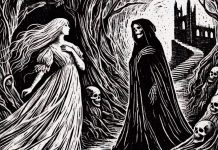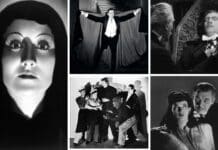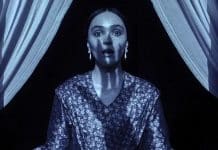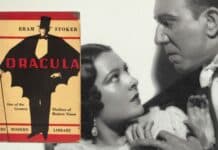CHARLES E. BUTLER reviews Dracula Lord of the Damned (2012).
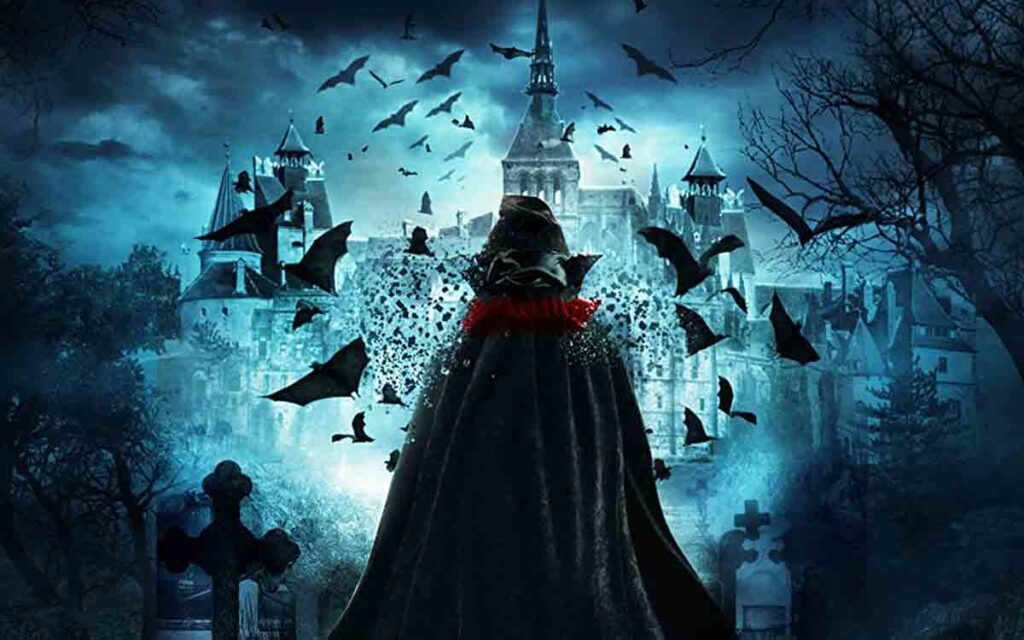
TITLE: Dracula Lord of the Damned
YEAR RELEASED: 2012
DIRECTOR: Theodore Trout
CAST: Theodore Trout, David McPherson and Amanda Lisman
Review of Dracula Lord of the Damned 2012
This film came to my attention via the internet.
Stills had been posted on my Count Dracula Facebook Page and they looked very interesting.
I contacted the director, Mr Trout and asked his permission to view the film.
Quicker than Bram Stoker’s postal service, a copy arrived via airmail, and I sat down to watch it on the early morning of 22nd July 2012.
The film opens with a quote from Revelations, and, indeed, the film itself is a revelation.
A live-action and painstakingly animated shock to all the senses.
With cartoon effects, Dracula shapeshifts, changes and transmogrophies before your very eyes.
His own eyes glow like head lamps and he also mutates into stylized versions of Graf Orlok and Kurt Barlow from Nosferatu (1922) and Salem’s Lot (1979), respectively, merging the three characters seamlessly in one film for the first time in Dracula’s movie history.
In the blink of an eye, he becomes a wall walking insect, a bat, an owl, a giant polymorphous creature and a teenage boy.
His unearthly powers seem to have no end.
Identifying himself as Vlad Tepes, the impaler, he quotes the tyrants historical horrors and admits to enjoying his tortures for two years in a Turkish prison cell.
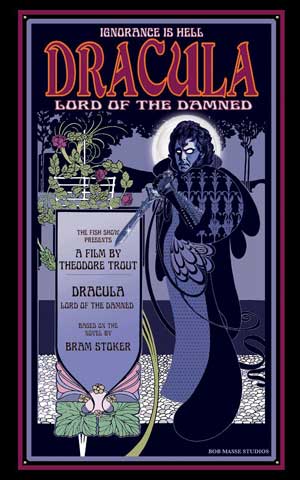
He gives reasons for his impalements as an excuse for the savagery of the times. As a Voivode, he confesses that he had to keep the fear and respect from his underlings, assuring Harker that an impalement must be performed with extreme care so that the victim doesn’t expire from shock immediately. He lovingly performs the rudimentary act of impalement for his guest using a sword and a piece of baloney sausage.
He claims to have been cut down in battle with an axe and to have risen three days later, now believing himself to be the New Messiah, spreading the gift of immortal life across the world.
He threatens Harker with dismemberment if he refuses to write letters home to his fiancée, Mina, stating that he must stay at the castle for a month to perform trivial tasks and wish you were here!
Talking in a deep, echoing growl, with perhaps, the most sadistic sense of humour than many of the Counts before him, he eats, drinks and smokes and keeps four brides in his cellars.
He bites a chunk out of the Holy Bible and can only be held at bay with mirrors that show him for what he really is, a walking pestilence.
His castle is located in a vast mountain region forever dense with fog and splashed with rain.
Harker has to venture through dark caverns lined with gargoyles and impaled corpses to reach his destination.
Truth be known, there is no explanation for what or who this Count actually is, as he is described as both a vampire and a wendigo – a shape-shifting phantom of Canadian superstition.
Like so few of his screen brethren, his motives are narrowed down to ambiguity and the focus on his all too real powers, give the film and the character a real strength that is missing from many official adaptations.
Mr Trout plays this creature of fevered imaginings with a naturalistic turn that is very disarming as he has perfectly caught the winking nods that Stoker only refers to in passing in the novel.
Not the greatest Count on record, but I imagine that it would have been enjoyed immensely by the red-bearded author.
Lord of the Damned makes many nods to preceding Dracula movies too.
The impeccable use of eerie landscape standing in for the mountains of Transylvania convey homage to Trout’s own favourite Dracula film, Werner Hertzog’s Nosferatu, the Vampyre (1979).
The ferryman taking Harker downstream gives one thoughts of Carl Dreyer’s classic movie, Vampyr (1932) and some speeded up steadicam shots evoke Francis Ford Coppola’s Bram Stoker’s Dracula (1992).
The castle ornamentation gives us an impressive stone maze of turrets and endless stone catacombs.
Mr Trout also adds fixtures in the shape of imposing stock shots of England’s Whitby Abbey.
The echoing and haunting soundtrack – again an acknowledgement of Werner Herzog – is effective, but unfortunately drowns out some of the dialogue, making it difficult on occasion to hear the punchlines to some very well thought out dialogue and inventive conversation.
Much of the background characterization is perfunctory at best for many of the key roles.
Dr Seward and Quincey Morris hold the same function as in the novel itself. Mainly standing around swallowing Van Helsing’s waffle.
Seward is accepted as Lucy’s suitor, but she plans to involve best man Quincey in her marital games once she has the doctor’s ring on her finger.
Jonathan Harker witnesses all the horrors that Stoker has to offer and more as he is locked in Count Dracula’s mis-matched mountain domain and welcomes the advances of four very slattern brides who – in 1872 – sport pierced nipples and modern tattoo work complete with blazing eyes.
Dr Seward becomes a strong sidekick to Professor Van Helsing and helps to perform the lobotomy on greedy cannibal Renfield.
The lunatic himself, fills in the blanks in the Count’s history and is quoted as having eaten everything from a fly, to policemen to his landlady, to a horse!
This Renfield will pig out on anything to attain the afterlife that he believes he deserves.
Jonathan Harker and Mina quote voiceover chapters from their diaries with passages from the director’s imagination as opposed to Stoker’s laboured outpourings of love and honourable deeds that clog up the first few chapters of the book.
They don’t marry in this film, but use amorous nods to each other in their rambling prose.
Mina doesn’t take the blood communion when cornered by Dracula, but instead is taken doggy style by Dracula’s pestilential Id, the walking Nosferatu.
Lucy Westwood becomes a cheap tart of some means.
Greeting her suitors naked under a silken robe and sporting a shaved pudenda!
She returns from the grave as a blood sodden inversion of the Madonna and says goodbye to her suitor crying blood and tears.
She enjoys a very animated death sequence in every sense of the term, writhing and shape-shifting in quick succession as the stake is hammered home.
I don’t wish to give out too many spoilers.
Mr Trout informs me that he has the film scheduled for more festival releases and also has an article dedicated to the movie in VideoScope magazine.
The movie has also deservedly won an award and has a great opening credit sequence in the shape of pencil illustrations that tell the story of the fall from grace of Vlad Tepes of Wallachia and his rise as an undead monster.
This is offset to the strains of heavy rock band Priestess – their song, Lay Down, written as Anton Phibes and Winslow Leach – and adds a great and refreshing vibe to the upbeat handling of the movie As a film make of sorts myself, I can only guess at the length of time that Trout laboured away in his tool shed editing the incredible highlights of this film.
I can also confidently prophesize that whatever becomes of Mr Trout’s film, the ideas inherent will be borrowed and used in more movies for years to come by film makers who have a fondness for the craft of making the fantastic happen and I hope that we see a lot more from the very talented writer/director, who may have, single-handedly, breathed a whole new and original life into everyone’s favourite bloodsucker.
A very inspirational gem of a movie that everyone even remotely interested in Dracula should see.
CHARLES E. BUTLER is the author of The Romance of Dracula and the newly-released Vampires Everywhere: The Rise of the Movie UnDead. Read our Spooky Isles interview with Charles Butler here.
Dracula Lord of the Damned 2012 Trailer
Tell us what you think of Dracula Lord of the Damned 2012 in the comments section below!


